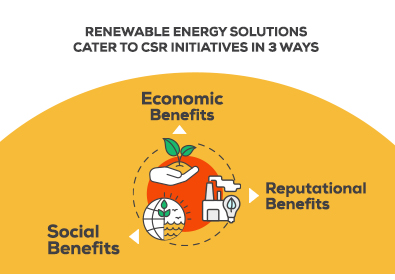Renewable Energy is the optimal way to reduce harmful environmental carbon emissions. Renewable power generation is widely beneficial for businesses and households countrymen. One of the most popular types of renewable energy alternatives is solar power. There is an industrial concept of corporate social responsibility (CSR), which represents the responsibility on the end of the corporate sector towards society. Solar energy also helps industrial and corporate bodies with the same on a massive scale. This article will enlighten your brain with the knowledge and benefits of bringing renewable energy into industrial and corporate business setups for the fulfilment of corporate social responsibility.
Concept of Corporate Social Responsibility (CSR)
In recent years, corporate social responsibility (CSR) has become an integral part of many businesses and corporate practices around the world. CSR refers to a company’s commitment to operating in an ethical, sustainable, and socially responsible manner. It is a positive gesture from corporates and industrial systems to fulfil their corporate responsibility towards social benefit.
Solar Energy and Corporate Social Responsibility
Energy has been a primary focus of companies in recent times. This case is more relatable to the countries more exposed to and prone to climate change. Therefore, businesses are increasingly putting their CSR efforts into adopting and promoting renewable energy sources, particularly solar energy.
Solar energy plays a crucial role in CSR initiatives, offering numerous environmental, social, and economic benefits. In this blog post, we will explore the significance and impact of solar energy in corporate social responsibility initiatives.

Businesses can serve Environmental Benefits from Solar
Solar energy is a clean and renewable energy source that helps reduce greenhouse gas emissions and combat climate change. One of the primary environmental benefits of solar energy is that it does not produce any harmful pollutants during energy generation. Traditional fossil fuel-based energy sources, such as coal or natural gas, release carbon dioxide and other emissions contributing to air pollution and climate change. By incorporating solar energy into their CSR initiatives, companies actively contribute to reducing their carbon footprint and preserving the environment for future generations.
Additionally, solar energy systems require minimal water usage compared to other forms of electricity generation. This is especially relevant in regions where water scarcity is a pressing issue. Companies demonstrate their commitment to sustainable resource management and conservation by opting for solar energy.
Business Impact on Social Canvas through Renewable Energy Options
Beyond the environmental advantages, solar energy also brings various social benefits and contributes to local communities. One of the primary social benefits is the creation of green jobs. As the demand for solar energy increases, more employment opportunities are created, both in manufacturing solar panels and installing solar systems. These jobs provide income and stability for individuals, stimulating local economies and reducing unemployment rates.
Moreover, solar energy initiatives can enhance energy access in underserved communities and developing regions. In areas with limited access to electricity grids or unreliable energy supply, deploying solar energy solutions can provide a reliable and sustainable power source. This enhances living standards, improves healthcare facilities, enables education opportunities, and facilitates economic development, thus positively impacting local communities.
Economic Benefits of Solar Energy in CSR Initiatives
Adopting solar energy in CSR initiatives also offers economic advantages for companies. Firstly, solar energy systems can help reduce electricity bills, particularly in buildings with large energy consumption, such as manufacturing facilities or data centres. By generating electricity on-site, businesses can significantly lower their operating costs, improving their financial performance.
Additionally, governmental regulations and incentives increasingly favour the adoption of renewable energy sources. Many countries provide tax credits, grants, or subsidies to organizations that invest in solar energy systems. These incentives encourage businesses to transition to renewables and provide financial support, making solar energy projects more economically viable.
Solar Energy Enhances the Reputation of Businesses
Integrating solar energy into CSR initiatives can significantly enhance a company’s brand reputation. Consumers today are increasingly concerned about environmental issues and sustainability practices. By visibly supporting solar energy, companies show their commitment to fighting climate change and reducing their environmental impact. This resonates with environmentally conscious consumers who are more likely to support and purchase products or services from socially responsible businesses.
Moreover, a strong CSR strategy that includes solar energy initiatives can help attract and retain top talent. Employees are more likely to feel proud and motivated to work for a company that aligns with their values and contributes to sustainable initiatives. This, in turn, can lead to increased employee satisfaction, loyalty, and productivity.
Zero Carbon Solar Solutions Are Available
Zero Carbon offers customised solar solutions catering to the energy needs of Pakistan’s residential, industrial, commercial, and agricultural setups. You can contact us to get the best of the solar energy installations and information.
A contact form is available.
Conclusion
Renewable energy includes solar, wind, or mediums. Solar energy plays a crucial role in corporate social responsibility (CSR) initiatives by providing numerous environmental, social, and economic benefits. From reducing carbon emissions to enhancing energy access in progressed communities, solar energy initiatives profoundly impact communities and the planet. Moreover, integrating solar energy into CSR strategies can enhance brand reputation and improve financial performance. As the world moves towards a more sustainable future, solar energy will continue to be a key component in corporate social responsibility efforts, driving positive change and setting a precedent for other businesses to follow.




